FFTP, Honduras President Discuss Commitment to Addressing Poverty
COCONUT CREEK, Fla. (March 24, 2022) A team from Food For The Poor recently met with Honduras President Xiomara Castro and talked about the overwhelming needs of impoverished people in that country and how they might work together to provide lasting solutions to help families through the donation of land and matching government funds.
The poverty rate in Honduras is about 74 percent, according to government estimates, and more than half live in extreme poverty with the pandemic and related economic recession erasing many of the gains made in the last decade.
In a wide-ranging discussion that lasted more than an hour, President Castro told the FFTP team that 6,000 of the nation’s 21,000 schools don’t have running water, which means they have no ability to feed the children at school.
The FFTP team led by President/CEO Ed Raine recently traveled to Honduras to celebrate the grand opening and blessing of the Medical Center for Children with Cancer as well as to visit CEPUDO, its longtime trusted partner, and the ongoing projects funded by the charity’s generous donors. Watch here: https://www.youtube.com/watch?v=IdR1E6RIaZE
CEPUDO President Linda Coello introduced Raine and the FFTP team to President Castro, who visited the charity’s Coconut Creek headquarters about a decade ago when she was First Lady of Honduras. Castro was sworn in as president in January.
“President Castro has a heart for the poor,” Raine said. “As a mother herself, it weighs on her how the poor suffer in her country. This was a very good conversation and we look forward to a continuing dialogue.”
Honduras has several areas with concentrations of extreme poverty, such as in San Pedro Sula, where families live in makeshift shacks along a river that frequently floods, or in communities along the southern coast in a tidal plan that floods all the time.
All of these areas are examples where the charity might work with the government of Honduras.
“Our aim is to provide effective solutions including food, water and access to healthcare,” Raine said. “We have an array of solutions to address these insecurities, including building sustainable communities.”
Renovating existing schools is another possibility. “If you don’t have running water in schools, it’s not an ideal learning environment,” Raine said.
FFTP began serving in Honduras in 1999, after the Central American country was slammed by Hurricane Mitch in 1998. The charity works with its partner CEPUDO, which is based in San Pedro Sula in Honduras, and the Order of Malta.
Over the years, the charity has built 10,530 homes and bult, repaired or expanded 175 schools in Honduras.
After back-to-back hurricanes in November 2020, FFTP’s donors and CEPUDO restored hundreds of homes, a community center, schools, a bakery and a plantain chip factory that were flooded. They also assisted farmers with replanting crops.
In 2021, FFTP shipped 352 tractor-trailer loads of essential items to Honduras as families struggled with both the aftermath of the hurricanes and the crippling effects of the COVID-19 pandemic.
“It’s very important to step back every now and then and say, ‘We’ve done all of these things, but what else needs to be done?'” Raine said. “How do we make sure that whatever solution we’re applying really addresses the problems of poverty and has the long-lasting transformation we all greatly desire?”
Food For The Poor, one of the largest international relief and development organizations in the nation, does much more than feed millions of hungry children and families living in poverty primarily in 17 countries of the Caribbean and Latin America. This interdenominational Christian ministry provides emergency relief assistance, clean water, medicine, educational materials, homes, support for vulnerable children, care for the aged, skills training and micro-enterprise development assistance. For more information, please visit www.FoodForThePoor.org.
Michael Turnbell
Communications Associate
954-471-0928 – mobile
michaelt@foodforthepoor.com
